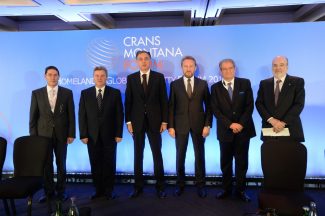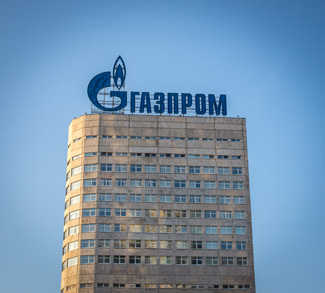As an ominous corollary to the 20 years’ crisis that went from 2001 to 2021, the significance of the ongoing Ukraine war cannot be understated. This conflict represents the most seismic geopolitical turning point of the current century for several reasons: the global balance of power within the international system is at stake in this exceedingly complex confrontation which is being fought in several overlapping battlespaces, such as the actual kinetic operational theatre, the economic chessboard, the realm of money and finance, the infosphere, the domain of energy, cyberspace, the covert netherworld of ‘active measures,’ and even the field of colliding ideological worldviews. Another remarkable feature is that things can easily spiral out of control and trigger an escalation of dangerous proportions due to several factors, including:
- The support provided by the West to Ukraine through the delivery of weapons, cash and intelligence. Eventually, the Russians might decide to target the logistical supply lines through which these deliveries flow.
- The presence of Western special operations squads and military advisers in Ukraine.
- Heightened tensions between Russia and NATO members like Poland and the Baltics.
- The parallel emergence of hostilities in contentious flashpoints (Kaliningrad, Transnistria, Kosovo).
- Targeted assassinations of high-value targets or acts of sabotage against critical infrastructure.
- Tactical miscalculations and mistakes.
- The Kremlin’s nuclear sabre-rattling and the orchestration of cyberattacks against NATO members.
- Potential unrest in Russia, either spontaneous or masterminded by Western states.
- An atmosphere of mutual animosity, distrust, fear and contempt, as well as the influence of bellicose uncompromising rhetoric.
Furthermore, this is not a peripheral event. In fact, the very core of the Eurasian heartland —the key area whose control is essential for world domination— is being fought over, something that has not taken place on such a large scale since World War Two. Likewise, the profile of the protagonists is noteworthy. For the Russians, this is an existential struggle for all intents and purposes, as well as a risky gamble. Success could restore the role of Russia as a major force to be reckoned with and revert the humiliating setbacks that Moscow had to endure after the implosion of the Soviet Union, regarded by President Vladimir Putin as a major geopolitical catastrophe due to the loss of strategic depth. For the US, the UK and other states that share an Atlanticist orientation, this crisis offers a window of opportunity to bleed Russia dry in a nasty quagmire until it collapses, and without having to fight the Russians; it also represents a chance to strengthen the cohesiveness of NATO. Thus, from the Western viewpoint, the demise of Russia as a great power would be the first step in the conformation of a collective effort or alliance specifically conceived to encircle and target China, identified by the Americans and their maritime allies as their top strategic competitor in the coming decades. Therefore, the Ukraine war can undermine the Middle Kingdom’s ambitious plans to reassert itself both as the linchpin of an Eurasian geoeconomic axis and also as the superpower that would overtake US hegemony in a peaceful way (i.e. through non-military means). However, Beijing cannot afford to get directly involved due to the potentially harmful impacts related to the underlying threat of economic warfare. Therefore, there are powerful incentives that discourage concessions. At least for the time being, backing down in order to reach a negotiated settlement would be equivalent to conceding defeat. On the contrary, the heavyweight players involved in this drama have powerful reasons to push far until their adversaries are vanquished.
On the other hand, for continental European powers like France and Germany, the Ukraine war represents a game-changer, a rude awakening and deadly reminder that both strategic neglect and daydreaming about the illusion of everlasting peace are recipes for disaster. It remains to be seen whether Paris and Berlin will rediscover the intellectual tradition of statecraft inspired by raison d’état and Realpolitik that they cultivated for centuries or if their fate will be mugged by realities beyond their control. For everybody else (especially regional powers), this episode provides dilemmas, challenges, risks and opportunities. Hence, states that seek to reposition themselves as rising powers like Turkey, India, Iran, Israel, Brazil, Mexico are aware that it will entail tectonic implications for their own contextual environments and national interests. The orientation of their corresponding geopolitical alignments will likely be reshuffled in the near future. In the meantime, they can wait dispassionately until there is a clear result, hedge their bets, or take sides.
In this regard, it is soon to tell how things will play out in the following months and years. The conflict is remarkably complex and there are dozens of variables that need to be taken into account. Nevertheless, it is possible to rely on strategic foresight in order to explore how the trajectory of this phenomenon could evolve. Therefore, the purpose of the following hypothetical scenarios is to keep things in perspective in a coolheaded way and to highlight what is at stake in this eventful episode whose aftermath will be felt for generations. Although it is not an exact science, this technique is helpful to develop situational awareness.
Scenario 1: Russian Victory
After the 2004 Orange Revolution and the Euromaidan protests that erupted a decade later ‒both of which provoked the rise of pro-Western governments in Kiev ‒ the Russian Federation has been trying to bring back Ukraine to its geopolitical orbit. Without the control of Ukraine (either direct or indirect), the national security of the Russian state is in danger, especially if it absorbed by a potentially hostile military alliance like NATO. Therefore, Moscow implemented a series of measures intended to increase pressure in order to alter Kiev’s strategic orientation, neither of which turned out to be successful. When none of these efforts worked, the Kremlin issued an ultimatum demanding a series of geopolitical concessions from the West and the redistribution of spheres of influence. Nevertheless, it was not even taken seriously. Therefore, the Russians decided that the only way to prevent Ukraine from becoming an anti-Russian spearhead was to use force. As former KGB spooks, Vladimir Putin and the siloviki clan likely concluded that the campaign would be nasty and that there would be a lot of unpleasant blowback, but they decided to go ahead anyway because the potential benefits would outweigh the costs. Accordingly, the main outcome that the Russians seek to accomplish is the military conquest of Ukraine or to dismantle it as a functional national state that cannot pose a meaningful threat to Russia in the decades ahead.
So far, the evidence indicates that Russia will try to annex the Donbass, the southern coastline and perhaps even most of the area east of the Dnieper River as the province of Novorossiya. Moreover, such territory contains strategic assets such as natural resources, industrial infrastructure, ports that operate as gateways to engage in international trade, and a population that shares many sociocultural affinities with the so-called Russian world. It is not known what would happen to the rest of Ukraine if the Russians manage to prevail decisively. However, taking Kiev ‒ or at least provoking regime change ‒ would be needed in order to prevent the eventual conformation of a polity aligned with the West. If the Russians win, they will behead the government headed by Volodymyr Zelensky and replace it with an administration organically tied to Moscow in every meaningful respect. In this case, this diminished client state would resemble Belarus, but the prospective satellite would be artificially dysfunctional by design so that it had no choice but to rely on the Russian Federation for pretty much everything, including security, energy, and economic exchanges.
Under such conditions, it would be tempting to take Moldova or at the very least strengthen Russia’s military presence in Transnistria, especially if the Kremlin captures Odessa. Otherwise, the incorporation of Moldova into NATO and/or the EU would be merely a matter of time. The historical region of Bessarabia ‒ which roughly corresponds to modern-day Moldova ‒ is both a geopolitical anchor and a corridor in close proximity to the Carpathians. This masterstroke would boost the role of Russia as the hegemonic power in the post-Soviet space (including Eastern Europe, Central Asia, and Transcaucasia), a reality that would consolidate the regional multilateral structures sponsored by Moscow, including the Eurasian Economic Union and the Collective Security Treaty Organisation. Needless to say, this would be the best-case scenario for the Kremlin. The neo-Byzantine Russian imperial tradition would flourish once again.
In contrast, Western Ukraine is an entirely different matter. Considering the region’s history, identity, and demographics, a Russian occupation would likely lead to an intense and vicious counterinsurgency that it would be best to avoid. Therefore, from the Russian viewpoint, it would not be unreasonable to consider the partition of Ukraine to avert such development but also to offer attractive concessions to nearby European states as an olive branch that could help mitigate the resulting tensions. Hence, considering common denominators in terms of ethnicity, Poland might end up absorbing Galicia and Hungary could swallow Transcarpathia. Sharing the spoils of war with Warsaw and Budapest sounds counterintuitive at a first but it would not necessarily be a foolish idea, especially because Moscow also expects that the fallout of the Ukraine War will set in motion a chain of events that will shake the European peninsula.
As retaliation for the invasion of Ukraine, Russia has been hit with measures of economic and financial coercion. Nevertheless, some of these sanctions have also unleashed unpleasant consequences for several European economies. In this regard, the balance of resolve favours Moscow. The Russians take pride in their ability to withstand hardship and they have never been as prosperous as the wealthiest Western nations anyway. Therefore, the Kremlin believes that Russian levels of resilience, and their pain thresholds, are higher than those of Western European societies. From the Russian perspective, the average EU citizen is used to comfort, ideologically committed to postmodern worldviews, and reluctant to even acknowledge what the quintessential concept of the political unfolds under harsh Hobbesian circumstances. Thus, the Russians expect that the weaponization of complex interdependence in accordance with the theoretical axioms of “hybrid warfare” and the mobilisation of asymmetric equalisers will intensify political chaos and economic turmoil in Western European societies. Moreover, there are force multipliers that Moscow is taking advantage of in order to instigate a widespread Weimar-like crisis. Consequently, the combination of food shortages, the scarcity of fertilisers, social unrest, energy disruptions, growing waves of immigrants from the MENA region, simmering psychological pressure, and the harmful short-term impact of unpopular environmental policies will bring down the governments of several EU countries, particularly Germany, France, and Italy. For the Russians, it would be convenient if European leaders aligned with militant Atlanticism are replaced by either representatives of nationalist forces and/or realist statesmen in the tradition of Machiavelli, Richelieu, Talleyrand, Metternich, and Bismarck. The idea that Berlin, Paris, or Rome might then abandon NATO is unlikely, but Moscow believes that it would be possible to reach some sort of pragmatic accommodation with such leaders.
The realization of this scenario would be consequential for China and the US. For Beijing, a Russian victory would embolden the pursuit of its revisionist agenda in the Indo-Pacific and it would also facilitate the implementation of its ambitious geoeonomic plans for the Eurasian landmass. Likewise, after the devastation of war, the need to start reconstruction would generate profitable business opportunities for Chinese companies and banking entities. For Washington, this would be a major setback, but not necessarily a nightmare. The dreams to freeze history under unipolar American leadership would be undone and a Russian success would give birth to a multipolar era. In turn, Europe would find itself in a new Cold War, something that could be strategically manageable, as long as levelheadedness prevails. The US would have no choice but to increase its military presence in Europe in order to keep in check Russian power, encourage détente to avert nuclear war and ensure that the core members of NATO remain politically united as a bloc with a shared strategic agenda.
Scenario 2: Protracted Conflict
In this scenario, there would be no clear winners. Russia would end up de facto controlling substantial portions of southern and eastern Ukraine, but it would not be able to conquer the rest of the country or capture Kiev. In turn, the Ukrainian government ‒ thanks to the generous support provided by NATO ‒ would be constantly trying to roll-back the territorial gains by the Russians and perhaps even retake Crimea. Moreover, Kiev would actively support the proliferation of rebel militias and the Russians would have no choice but to undertake counterinsurgency. Neither side would be willing to concede and the fighting would continue indefinitely. This is what Henry Kissinger was talking about when he said the conflict might eventually resemble a modern-day version of the Thirty Years’ War. In this regard, the Western idea of turning Ukraine into a black hole that depletes Russian resources until the national power of the Russian Federation is substantially weakened makes sense.
The problem is that every day that the conflict continues, the prospect of escalation will remain constant. For instance, the possibility that the Zaporizhzhia nuclear power plant is damaged either accidentally or deliberately has the potential to unleash both radioactive fallout a great deal of political blowback. Furthermore, failure to achieve a decisive victory would corner Moscow in a very uncomfortable position. Some Western policymakers seemingly believe that the Russian invasion of Ukraine will proceed like the Soviet military intervention if Afghanistan. However, the comparison is inaccurate. The former is an existential conflict for the Russians motivated by a perception of growing insecurity, the latter was an optional conflict launched when the URSS was a global superpower engaged in a bid for global hegemony. Therefore, in this scenario, the Kremlin might rely on tactical nukes in a desperate attempt to turn the tables in the battlefield. As Professor John Mearsheimer has argued, from the Russian viewpoint, if they cannot take Ukraine then they would make sure that nobody else can, even if that means that Ukraine is razed to the ground. Also, President Vladimir Putin’s position would be compromised if a victory seems elusive. The interpretation would be that he sacrificed a lot and achieved too little. Under such circumstances, there might be a regime change in Moscow but Putin would not be replaced by a pro-Western reformer eager to make peace. It is much more likely that he would be succeeded by an even more hawkish hardliner eager to deliver a promised victory.
Scenario 3: Uneasy Stalemate
This scenario is unlikely right now because the political willingness to make deals is absent, but a diplomatic compromise might become feasible if there is an increasing frustration and exhaustion in all sides or if they all agree that the continuation of the war is far too dangerous. Therefore, its materialisation would require the political acknowledgement that the crisis cannot be settled through force. The Russians could get the guarantee that Ukraine will follow a policy of strict neutrality and, in exchange for peace, the West could offer the concession that Kiev will not join NATO. Moreover, in order to obtain the recognition of Ukraine as a Russian satellite, Moscow can offer concessions in places like the Middle East, Latin America and Africa. After all, in those regions the Kremlin has accumulated bargaining chips worth trading for a much more important prize. Ukraine would mirror the position adopted by Austria throughout the Cold War. Alternatively, the facts on the ground might dictate its eventual partition.
However, the idea of ‘freezing the conflict’ would be a temporary ceasefire at best, not a permanent solution. Thus, without addressing the comprehensive redistribution of spheres of influence ‒ both in Europe and elsewhere ‒ and the redefinition of the European security architecture based on a multipolar logic, the influence of incompatible geopolitical interests would inevitably lead to a rematch sooner or later. Otherwise, both Moscow and NATO would be essentially buying time until the next confrontation takes place and other contentious flashpoints would be constantly fuelling tensions.
Scenario 4: Russian Collapse
This is the outcome preferred by both staunch Atlanticist policymakers and neoconservative thinkers. In this case, Russia experiences a full-spectrum defeat due to the fierce Ukrainian resistance and the combined weight of Western economic firepower. Such possibility would lead to the withdrawal of Russian forces from Ukraine and the downfall of Putin and the whole siloviki ruling elite. Afterwards, Russia would eschew its imperial tradition, abandon its geopolitical ambitions in the “near abroad” and embrace the Western political, societal, economic and ideological models. In turn, Ukraine would become a full NATO member as a heavily militarised pro-Western bulwark that would forever keep Russians forces at bay. Based on the pivotal role played by the ill-fared Soviet military intervention in Afghanistan in the demise of the USSR, some commentators go even further and claim that the Russian invasion of Ukraine will backfire so spectacularly that it will provoke the demise of the Russian Federation as a functional national state and its fragmentation into several statelets, some of which will have no choice but to adopt a pro-Western strategic orientation.
Nevertheless, this scenario would be deeply troublesome. The Balkanisation of Russia would open Pandora’s box and it would be much more dangerous than the violent disintegration of the former Yugoslavia due to the presence of a vast nuclear arsenal and the existence of attractive deposits of all sorts of natural resources. There is no way to tell how such drama would unfold. Nonetheless, since the law of capillarity dictates that nature abhors vacuums, such process would attract the predatory engagement of states able to harness the power void left by Moscow: Poland, Turkey, Japan, China, Iran would scramble to take advantage of the ensuing crisis, setting the Eurasian Grossraum on fire. Furthermore, civil war, the proliferation of regional warlords, the rise of revanchist strongmen and ethnic conflicts are very real possibilities. Moreover, without the weight of Russia as a telluric geopolitical anchor, turmoil would engulf much of the post-Soviet space, unfreezing several local conflicts. Yet, this chaos would not be unwelcome in Washington, as a long as the ugliness of the aftermath can be contained, especially because this development would mean the end of a powerful rival and also because it would prevent the completion of China’s plans to assert itself as the cornerstone of a vast geoeconomic web that spans the whole Eurasian landmass. With the Russian behemoth gone, Washington and its allies would be able to focus their efforts against the Middle Kingdom.
Concluding Remarks
The scenarios presented above reveal that, one way or another, after the Ukraine war, the international system will not return to the previous status quo. In fact, due to its far-reaching shockwaves, the conflict will reshuffle the global corelation of geopolitical forces in a drastic manner. Furthermore, there is no easy solution in sight and every single conceivable outcome is problematic. Hence, this event will give birth to an era of increasing uncertainty, instability and danger. The world order is literally being rewritten in this chapter and, as a result, the Earth will be inherited by the wisest and the strongest, not by the meek. In an ominous way, this is an interesting age whose consequences will shape the lives of millions for generations, for better or worse. Eventually, a new order will arise from the tragic ashes of the old one. Then again, from a long-range perspective, there is nothing new. History reveals that the violent reconfiguration of a balance of power is the norm rather than the exception. After all, the essence of human nature remains unchanged since the times of the Pharaohs and the anarchic structure of the international system prevails. There must be a clear distinction that differentiates what is desirable in terms of abstract formulations from what is possible in concrete reality. A sober understanding of political science and international relations must be based on such unpleasant assumptions in order to offer accurate analytical interpretations, develop strategic intelligence as a tool enhance preparedness, and sharpen the practice of statecraft. Therefore, why would the 21st century be any different? Despite flowery rhetoric, there is no such thing an as arc of the moral universe that bends towards justice or progress. That belief is a naïve illusion, if not a dangerous mirage that can lead to disastrous repercussions. In fact, the more things change in the endless drama of great power politics, the more they remain the same and so what has transpired countless times will occur yet again.
The views expressed in this article belong to the authors alone and do not necessarily reflect those of Geopoliticalmonitor.com




